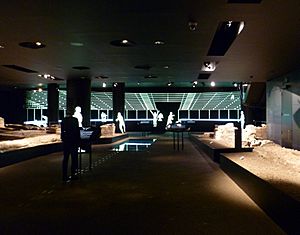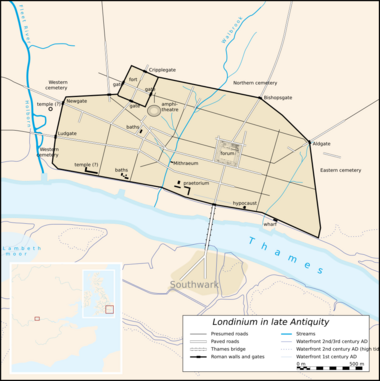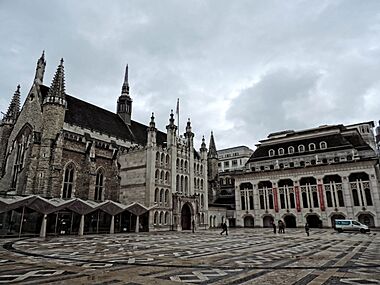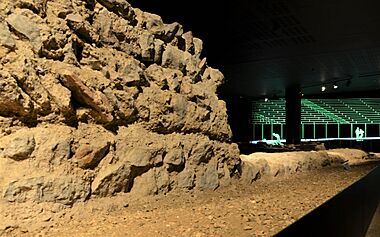Amphitheatre (London) facts for kids
Quick facts for kids Roman amphitheatre |
|
|---|---|

|
|
| Location | City of London, England, United Kingdom |
| Built | AD 70 |
| Governing body | English Heritage |
| Official name: Roman amphitheatre, Guildhall Yard | |
| Designated | 23 July 1990 |
| Reference no. | 1013411 |
Imagine a huge arena hidden right under a busy city square! That's exactly what you'll find beneath Guildhall Yard in the City of London. Here lie the amazing remains of a Roman amphitheatre built when London was a Roman city.
You can even see some of these ancient structures today. They are displayed in situ (which means "in their original place") in the basement of the Guildhall Art Gallery. This incredible site was discovered in 1988 and is now a scheduled monument. This means it's a very important historical place protected by law.
Contents
Discovering London's Roman Arena

London's very first Roman amphitheatre was built in the year AD 70. It was first made of wood. Later, in the early 2nd century, it was updated with strong stone walls and fancy tiled entrances.
What Happened at the Amphitheatre?
This large arena was a busy place for many public events. People gathered to watch exciting gladiator games. Soldiers and citizens were entertained by contests involving animals. Sometimes, public punishments also took place here. The amphitheatre was also used for important religious ceremonies.
After the ancient Romans left Britain in the early 5th century, the amphitheatre was no longer used. It slowly fell into disrepair and lay forgotten for many hundreds of years.
The Amphitheatre's Hidden History
Centuries later, in the 11th century, people started building in this area again. By the 12th century, the first London Guildhall was constructed right next to the old amphitheatre site. This Guildhall building is still standing today, even after surviving the Great Fire of London and World War II bombings.
Over time, more buildings were built around the amphitheatre's location. Eventually, this area became the public space known as Guildhall Yard. In the 13th century, a gatehouse was built as a formal entrance to Guildhall Yard. This gatehouse was placed directly over the southern entrance of the Roman amphitheatre.
Even the nearby church of St Lawrence Jewry shows a hint of the amphitheatre. Its unusual shape might have been designed to follow the oval outline of the ancient arena.
Seeing the Remains Today
The Guildhall Art Gallery was finished in 1999. It stands on the northern side of Guildhall Yard. If you visit the gallery, you can go down to the basement. There, you'll find an excavated part of the Roman amphitheatre remains.
On the surface of Guildhall Yard, you can see a special reminder of the past. A band of dark stone marks out the exact oval shape of the amphitheatre below. It's a cool way to imagine how big this ancient arena once was!
See also
 In Spanish: Anfiteatro romano de Londres para niños
In Spanish: Anfiteatro romano de Londres para niños
 | Kyle Baker |
 | Joseph Yoakum |
 | Laura Wheeler Waring |
 | Henry Ossawa Tanner |



